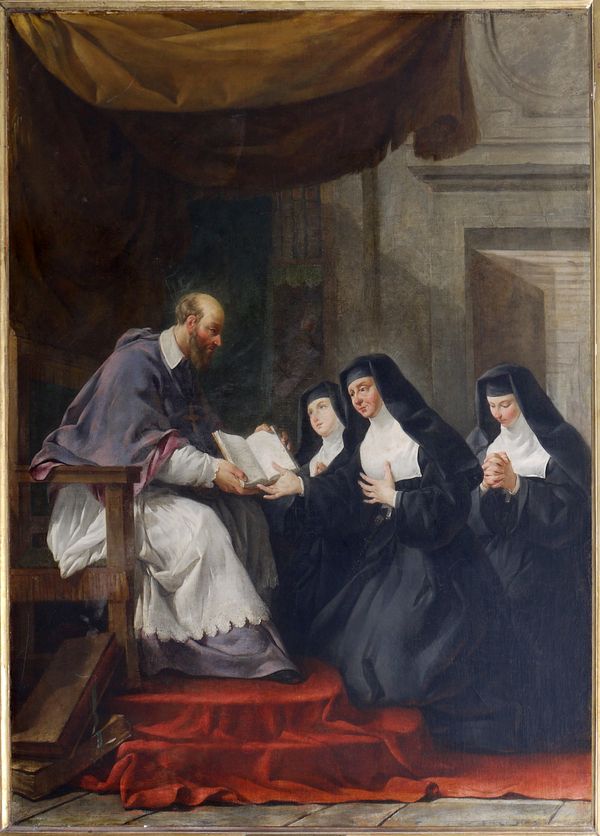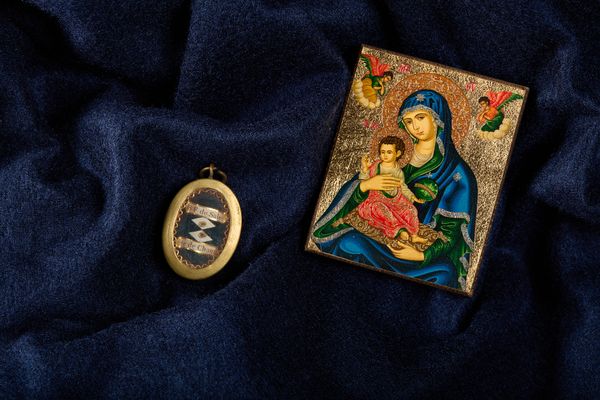Born Jeanne-Françoise Frémyot, her mother died when Jane was 18 months old. Her father became the main influence on her education. She developed into a woman of beauty and refinement.
Having turned down two prior suitors, in 1592, she married the Baron de Chantal when she was 20 and they lived in the Castle of Bourbilly. There they hosted hunting parties and other entertainments for the neighboring nobles. Their first two children died shortly after birth. When her older sister Margaret died, the baroness brought her three small children to Bourbilly. She and her husband subsequently had a son and three daughters. Baron de Chantal was occasionally away from home on service to the king. Chantal gained a reputation as an excellent manager of the estates of her husband, as well as of her difficult father-in-law, while also providing alms and nursing care to needy neighbors.
In 1601, the Baron was accidentally killed in a hunting accident. Left a widow at 28, with four children, the broken-hearted baroness took a vow of chastity. Chantal then put the estate in order and acceded to her father's request that she and her children to stay for a time with him in Dijon. She had not long returned to Bourbilly when she received a letter from her widowed father-in-law demanding that she live with him in his castle at Monthelon, Saône-et-Loire. Towards the end of 1602, Chantal closed up Bourbilly and moved to Monthelon.
In 1604, her father invited her to come to Dijon to hear the bishop of Geneva, Francis de Sales, preach the Lenten sermons at the Sainte Chapelle. They became close friends and de Sales became her spiritual director. He "...bade her avoid scruples, hurry, and anxiety of mind, which above all things hinder a soul on the road to spiritual perfection." At De Sales suggestion, she divided her time between Dijon and Monthelon so to attend to both her father and father-in-law.
...bade her avoid scruples, hurry, and anxiety of mind, which above all things hinder a soul on the road to spiritual perfection. St. Frances de Sales
In 1605, Pierre de Bérulle sent Anne of Jesus to found a Carmelite house in Dijon. She wanted to become a nun but he persuaded her to defer this decision. As for her request to perform additional austerities, De Sales was firm in advising between seven and eight hours sleep.
The Congregation of the Visitation was canonically established at Annecy on Trinity Sunday, 6 June 1610. Chantal had previously given over her wealth to her children, so the circumstances of the group were rather poor. The order accepted women who were rejected by other orders because of poor health or age. Their office was the Little Office of the Blessed Virgin Mary.
During its first eight years, the new order also was unusual in its public outreach, in contrast to most female religious who remained cloistered and adopted strict ascetic practices. A second convent was established in Lyon. The usual opposition to women in active ministry arose and Francis de Sales was obliged to make it a cloistered community following the Rule of St. Augustine. He wrote his Treatise on the Love of God for them. When people criticized her for accepting women of poor health and old age, Chantal famously said, "What do you want me to do? I like sick people myself; I'm on their side."
Her reputation for sanctity and sound management resulted in many visits by (and donations from) aristocratic women. The order had 13 houses by the time de Sales died, and 86 before Chantal herself died at the Visitation Convent in Moulins, aged 69. Vincent de Paul served as her spiritual director after de Sales' death. Her favorite devotions involved the Sacred Heart of Jesus and the Sacred Heart of Mary. Chantal was buried in the Annecy convent next to de Sales. The order had 164 houses by 1767, when she was canonized. Chantal outlived her son (who died fighting Huguenots and English on the Île de Ré during the century's religious wars) and two of her three daughters, but left extensive correspondence. Her granddaughter also became a famous writer, Marie de Rabutin-Chantal, marquise de Sévigné.

